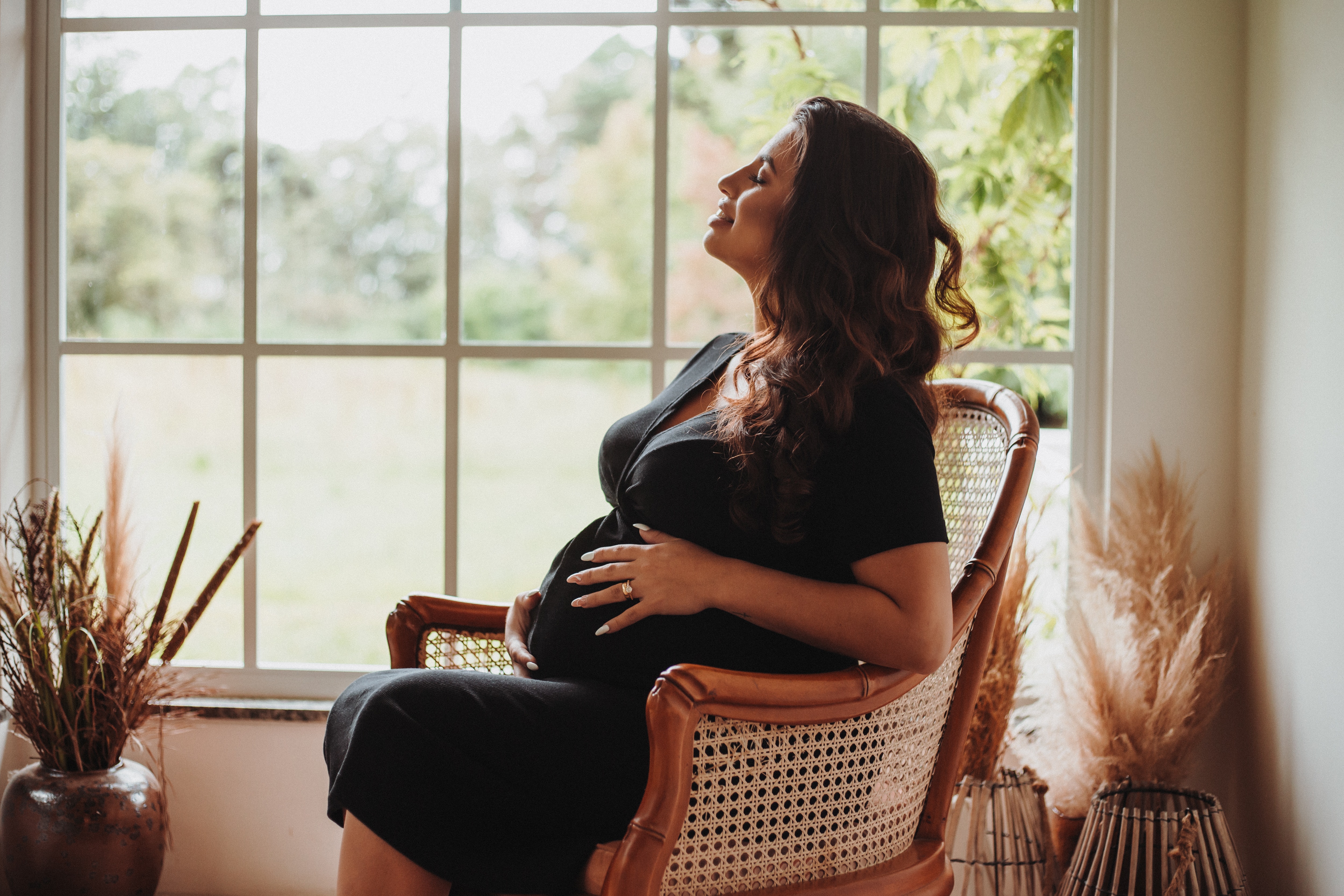How To Find The Best Sleep Position During Pregnancy

Sleep is an important part of overall health and well-being, and it is especially important during pregnancy. Pregnant women's sleep patterns and positions frequently change as a result of physical discomfort, hormonal fluctuations, and anxiety about impending birth and parenthood.
Preterm labour, gestational diabetes, hypertension, depression, and anxiety can all result from inadequate sleep quality and quantity during pregnancy. As a result, pregnant women must prioritize getting enough high-quality sleep throughout their pregnancy.
Sleep problems during pregnancy: What to expect
Pregnant women can experience a variety of problems. Some common sleep problems that pregnant women may encounter are:
- Insomnia: Having trouble falling or staying asleep is a major problem during pregnancy. Physical discomforts, such as back pain, heartburn, or frequent urination, can cause this. Insomnia can also be a result of hormone changes, anxiety, and anticipation about the pregnancy.
- Sleep apnea: Sleep apnea is a sleep condition that causes breathing to stop and start repeatedly during sleep. The combination of weight gain, hormonal changes, and increased pressure on the lungs and airways, can increase the risk of developing sleep apnea during pregnancy.
- Restless Leg Syndrome (RLS): RLS is a syndrome caused by an unpleasant sensation in the legs, which is often described as a "creepy-crawly" sensation. This sensation can make falling and staying asleep difficult.
- Nightmares: Hormone changes during pregnancy may result in more bad dreams or nightmares, which may interfere with sleep.
- Excessive snoring: Hormonal changes and weight gain during pregnancy can lead to snoring, which can hamper sleep.
- Frequent waking up during the night: As the pregnancy progresses, the need to urinate frequently may disturb sleep, and physical discomfort may cause discomfort that wakes you up.
During pregnancy, these issues can become more pronounced, and when you don't get enough sleep, you may feel more irritable and have difficulty maintaining a positive mental state.
Pregnancy guide: Which sleeping position is best during pregnancy?
It's essential to sleep in the correct position during pregnancy since everyone has their own comfortable sleeping position, and when the body undergoes significant changes, finding the right way to sleep becomes even more crucial.
During pregnancy, the best sleeping position is on your side, specifically your left side. Sleeping on your left side can help to improve blood and nutrient flow to your baby's placenta. This position can also aid digestion, reduce swelling, and relieve back pain.
Sleeping on your right side is also an option, but sleeping on your back is generally discouraged because the weight of the uterus can press on the spine, back muscles, intestines, and major blood vessels, causing discomfort and affecting circulation.

A pregnancy pillow can also help you find a comfortable sleeping position by supporting your belly and back. If you have any questions about your sleeping position or any other aspect of your pregnancy, always consult with your healthcare provider for personalized advice.
Sleep soundly during pregnancy - with the right cushioning, pillows, and mattress support!
During pregnancy, many women find it difficult to get a good night's sleep due to physical discomforts such as back pain, hip pain, and heartburn. However, with the right cushioning, pillows, and mattress support, you can improve your sleep quality and get the rest you need. Here are some tips:
- Invest in a good quality mattress: A supportive mattress that offers a medium level of firmness can help alleviate pressure points and provide the necessary support for your growing belly.
- Use a pregnancy pillow: A pregnancy pillow can provide extra support for your back, hips, and knees, helping you maintain a comfortable sleeping position. A C-shaped or U-shaped pregnancy pillow can be especially helpful in providing full-body support.
- Place a pillow between your knees: This can help align your hips and reduce the strain on your lower back.
- Elevate your upper body: If you are experiencing heartburn, elevating your upper body with a wedge pillow can help reduce symptoms.
- Avoid sleeping on your back: As your pregnancy progresses towards 9 months pregnant, it is best to avoid sleeping on your back as it can cause discomfort and potentially reduce blood flow to the baby.
By following these tips and finding the right cushioning, pillows, and mattress support, you can improve your sleep quality during pregnancy and help ensure a healthier, happier pregnancy overall.
There are many comfortable pregnancy pillows available in the market however, according to customer reviews and testimonials, many pregnant women have found newmi pregnancy pillows to be comfortable and supportive during pregnancy. The unique design of newmi pillows, which includes a C-shaped or U-shaped body pillow, can provide full-body support for pregnant women, helping to alleviate common discomforts such as back pain, hip pain, and poor circulation.
The perfect sleep during pregnancy
Getting adequate and restful sleep during pregnancy is important for both the mother and the developing baby. However, many pregnant women may experience difficulties falling and staying asleep due to physical discomfort, hormonal changes, and anxiety. Here are some tips to improve sleep during pregnancy:
- Create a bedtime routine: A relaxing bedtime routine can help signal to your body that it's time to sleep. This can include taking a warm bath, reading a book, listening to soothing music, or practising meditation or deep breathing exercises. Make your bedroom cool, quiet, and dark. Invest in a comfortable mattress and pillows, as well as comfortable sleepwear for complete pregnancy care.
- Watch your diet: Before going to bed, avoid caffeine as well as spicy or acidic foods. Instead, try a warm cup of herbal tea, such as chamomile or lavender tea, which can help promote relaxation.
- Stick to a consistent sleep schedule: Go to bed and wake up at the same time each day, even on weekends.
- Exercise regularly: Daily exercise can help in lowering anxiety and tension, which can disrupt sleep. Avoid working out too close to bedtime, as this can make it more challenging.
- Control your stress: Anxiety and stress might hinder your ability to sleep. Practice relaxation techniques like yoga, meditation, or deep breathing.
- Consult your doctor: If you have persistent sleep problems, see your doctor. They will assist you with medications as well as relaxation techniques.
Remember, getting enough restful sleep is important during pregnancy, so prioritize it as best you can.
Summing up
Finding the best sleep position during pregnancy is essential for getting a good night's sleep and reducing discomfort. Sleeping on the left side is generally recommended as it improves circulation to the baby and helps to alleviate pressure on the uterus and other organs.
However, it is important to remember that every woman's body is different, and what works for one woman may not work for another. Experimenting with different sleep positions and using pillows for support can help you find the most comfortable and safe sleep position for you and your baby. Additionally, maintaining a healthy lifestyle, managing stress, and avoiding caffeine and heavy meals before bedtime can all contribute to better sleep during pregnancy.
If you continue to have difficulty sleeping, be sure to speak with your healthcare provider for additional support and guidance.
Leave a Comment
Blogs
Popular Posts
Get the latest from Newmi
Subscribe to get Email Updates!
Thanks for subscribe.
Your response has been recorded.
COPYRIGHT © 2025 KA HEALTHCARE PVT LTD - ALL RIGHTS RESERVED.
Disclaimer: NEWMI CARE does not cater to any medical/Pregnancy or psychiatric emergencies. If you are in a life-threatening situation, please do NOT use this site. If you are feeling suicidal, we recommend you call a suicide prevention helpline or go to your nearest hospital.

0 Comment